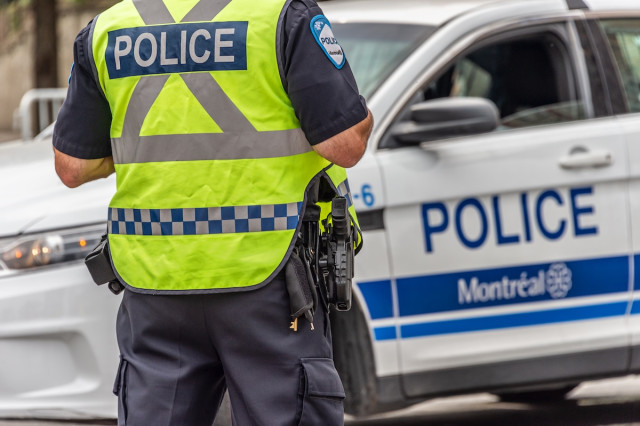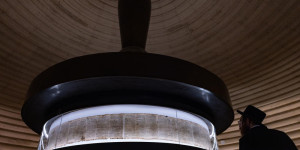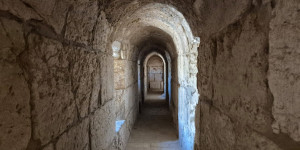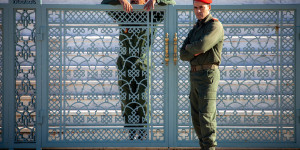Are police doing all they can to protect Jews?

When police arrive, an hour after a Jew is brutally beaten in front of his children, it’s time to realize that the safety of Diaspora Jews is not a top priority in their community. That was the recent sad state of affairs in Montreal, when a Jewish father was the victim of a violent attack.
If there was any doubt that this event was racially motivated, the man’s kippa, being forcibly removed from his head, by the perpetrator, should serve as proof positive that this was not a random assault.
Also a day late, in acknowledging what took place, was Canadian Prime Minister Mark Carney, who condemned the beating. But what message does it send when your local police department is as helpful as a glass of water given to someone who’s already choked to death?
When it comes to police protection, something we all take for granted, Holland’s Jews also can’t always rely on it. According to Dutch News, some police officers have refused to guard Jewish buildings, necessitating changes “to accommodate officers who have moral objections to protecting Jewish events.”
Who ever heard of a police officer being permitted to opt out of protecting a particular group of citizens? And how does morality come into play? Are Jews unworthy of the same defense afforded to others?
Equally worrisome is the situation in the U.K., where Jews have expressed their reticence to trust the police. This is partially due to the belief that Brits are losing their rights to free speech. Now, anything you post can be easily tracked by your personal ID, without which you cannot access many social media sites. “Enacted in 2023, under the Rishi Sunak government, the legislation was called, the “Online Safety Act,” allegedly for the public’s protection. Under Keir Starmer, it has come into full effect.”
Since it is being contended that British police are targeting the victims, rather than the perpetrators, then any Jew posting the evils of Palestinian protests or the violence that ensues from them, could actually run the risk of being targeted for publishing such opinions. Obviously, the effect of those consequences would end up silencing all Jews from reporting anything negative about the persecution or imminent threats they may face by those intending to harm them.
How absurd would it be for a British Jew to end up in prison as a result of fearing for their life. Instead of being protected by the police, they could be turned in for daring to expose the dangers to their community.
The truth is that ever since October 7th, many Jewish sites, throughout the world, including houses of worship, Jewish schools, institutions and restaurants, have received credible threats, necessitating the deployment of more police to those places, especially during Jewish holidays or events. With an upsurge of antisemitic incidents in France, Germany, Spain, Italy and the UK, more police have been dispatched, but how can a country like France, with half a million Jews, protect each one of them, when the threat of radical Muslims, there is so great?
This is true of much of Europe, even though their Jewish population is not as large. But what about the U.S., the country with the largest presence of Jews, only second to Israel? Can they rest assured that the police will arrive in time should an attack against them begin? After all, they are only one segment of the country which is now overwhelmed by an uptick in crime incidents in many major cities. So, if the U.S. can’t even ensure that many local cities are safe, why would special resources be dedicated solely to the Jewish communities of America when they represent a minority?
While it’s true they are especially vulnerable, so are many MAGA supporters who are hated by the Woke and progressive segments of society. Sadly, those groups are not above employing violence against their political rivals. Just imagine if you’re both Jewish and a MAGA devotee? Not a pretty picture!
That brings us to the question of how much longer do Jews have in the Diaspora, before they find themselves in a position where they can no longer count on local police, their governments or even their own resources to protect themselves and their families? The signs are already ominous.
A recent article entitled, “Antisemitism signals Aliyah” mentions a “dangerous new strain of antisemitism, emboldened and fueled by the war in Gaza.” One of the pieces of evidence cited is the number of countries preparing to recognize a Palestinian state, along with arms embargoes and economic sanctions against Israel– actions which are hastening a global anti-Jewish sentiment.
Consequently, the writer, Yigal Tzemach believes that Israel is on the verge of a massive wave of immigration. It’s hard to argue with that conclusion, because the moment Jews no longer feel safe enough to walk outside, attend school or their synagogues, that is the time when they begin to internalize that the quality of life they once enjoyed no longer exists. It’s a sobering thought but one which will lead to their consideration of other options.
Suddenly, the major hurdles of learning a new language, finding work in another country or having to leave behind all that is comfortable and familiar may not seem so daunting when compared with the sense that they are no longer safe or protected. Even though they might be able to weather the hostilities of the growing antisemitism, they will still feel as if there is no real future for their children and grandchildren.
Those considerations will prompt them to re-evaluate the feasibility of remaining in a country which no longer holds the same potential or freedoms that it did when they were growing up. It is that feeling, of the doors closing, which is often the final nail in the coffin, confronting the sad reality that the only safe place for a Jew today is the Jewish homeland.
Even though embroiled in a war, Israel still remains the most secure place for Jews, who know that they will be defended by an army, comprised of their own children. That’s significant, because what they’re finding out is that they don’t have that same protection in the countries where they once felt safe.

A former Jerusalem elementary and middle-school principal who made Aliyah in 1993 and became a member of Kibbutz Reim but now lives in the center of the country with her husband. She is the author of Mistake-Proof Parenting, based on the principles from the book of Proverbs - available on Amazon.













